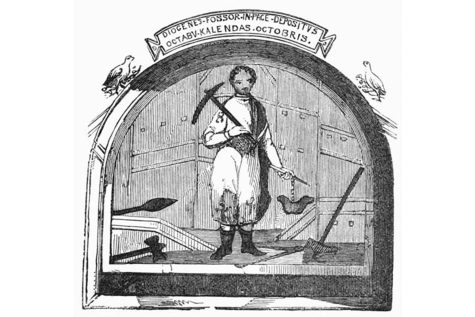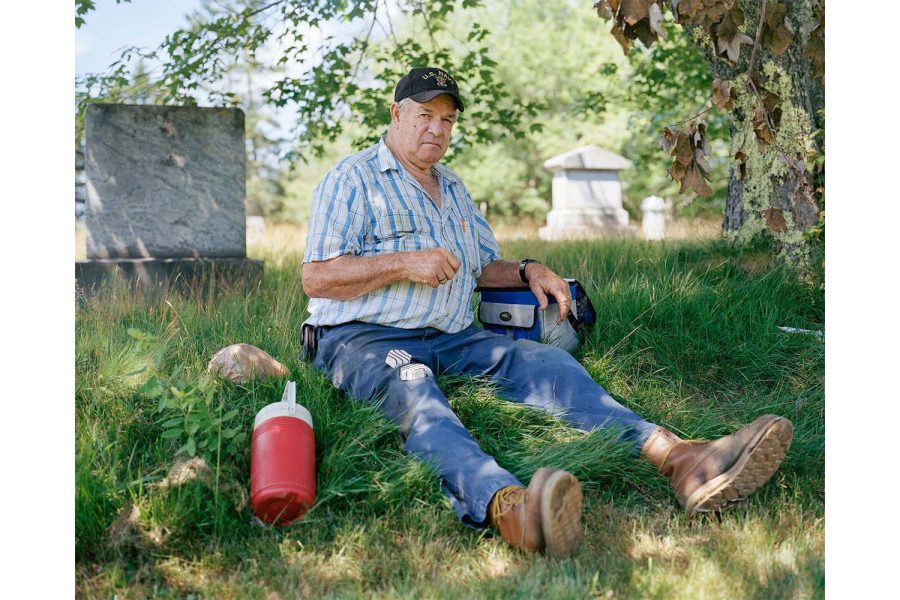UI photography professor explores gravedigging and grief in decade-long project
What started as a personal interest project in 2012 transformed into a once-in-a-lifetime opportunity to document the last traditional gravedigger in the U.S. — Thalassa Raasch captures the dying art and its relationship to grief in their project ‘In Over My Head.’
Thalassa Raasch’s portrait of gravedigger Everard Hall for their project titled “In Over My Head.” Contributed.
April 6, 2022
In a small-town diner in northeastern Maine, Thalassa Raasch met the last living traditional gravedigger in the U.S.
Through photography, film, audio, and other artistic mediums, Raasch sought to chronicle the dying art — and its relationship to the grieving process alongside it.
Raasch, an assistant professor of photography and experimental media at the University of Iowa, has been working on the project since 2012. When they first met Everard Hall, a gravedigger from Cherryfield, Maine, he was “holding court” in a tiny diner, surrounded by friendly waitresses and customers. They introduced themself as Thalassa, and Hall responded, “Can I call you Charlie?”
The photographer, who lived about four hours away at the time — working as a state-employed beekeeper — was immediately hooked by the potential for a once-in-a-lifetime project.
“We sat in his truck afterward, and he showed me this family-style photo album that he had in his truck,” Raasch said. “He photographed his own process through the years…starting the grave, digging the grave, how deep is the hole, filling it back in…that was initially what I was obsessed with.”
RELATED: Local realtor expands ever-growing network of Iowa City businesses
Over the years, Raasch grew closer to Hall, even living with the gravedigger and his family for a time. They tried to document everything they could, focused on capturing the digging of graves by hand, and what the process can mean to those involved. Raasch noted that after Hall retires or passes away, his job will be replaced by a backhoe, which brought an irrevocable quality to the project.
Raasch said they also became attached to the project because they had recently dealt with loss of their own and would often visit Hall to cope.
“For me, there’s a lot being lost in that kind of craft and that kind of person, both in knowledge, but also the sort of process of grief,” Raasch said. “I had a few people die in my life really quickly, like three folks in a matter of a month, and that’s actually when I went and started making photographs with him.”
In the decade since, Raasch has accumulated a massive amount of digital and physical photographs and film, as well as audio recordings, written anecdotes, and other bits and pieces of documentation. They have even collected a jar of dirt from the cemetery where Hall works.
RELATED: Dancer, teacher, poet, and cashier — Jhe Russell is a man of many talents
Now, Raasch is in the process of turning the project into a book, to be titled In Over My Head. As part of their research outside interacting with Hall, Raasch traveled to Italy on a grant from the Rhode Island School of Design in search of the oldest artistic depiction of gravedigging.
In the catacombs of Rome, they found a decrepit fresco that bore a striking resemblance to a portrait they took of the gravedigger. On one end of history sat Hall, taking his lunch break on a patch of grass, gravestones in the background — on the other, an eerily similar image of a figure holding a pickaxe in one hand, his own version of a lunchbox in the other, and ancient graves behind him.

“It’s wild, actually,” Raasch said. “2,400 years apart, it’s the same kind of picture.”
Although they are originally from Minnesota, Raasch lived in Maine from 2011 to 2021. While working on In Over My Head, they made money with a few beekeeping jobs, including one with the Maine State Beekeepers Association — a non-profit membership organization of beekeepers in Maine. Although they have been an avid beekeeper since the age of 17, Raasch mostly used the position to pay the bills.
They moved to Iowa City in August 2021 to pursue their new position with the UI’s School of Art and Art History. In doing so, they had to downsize their around 30 beehives to just five — luckily, Raasch said, they all made it through the winter.
“Honestly, I find beekeeping very meditative and relaxing,” Raasch said. “Lately I’ve been trying to think about like, is there a way I could collaborate with my bees, or make some photographs with them… I actually think this summer, I might do some experiments.”
Raasch is currently in talks with various possible publishers for In Over My Head. They said that ultimately, the project, and its future manifestation as a book, are reflections of their artistic process as a whole.
“Art-making is really a way for me to process my place in the world, being a human alive today on Earth,” Raasch said. “It sounds kind of corny, but it’s like a philosophy — it’s like a way of being in the world. It’s the kind of way that I want to exist.”



